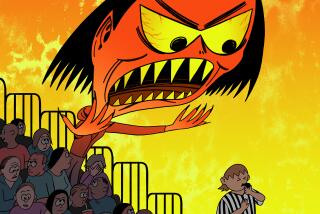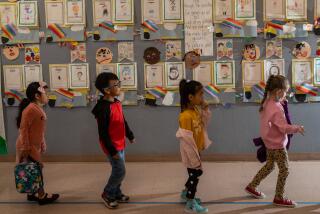When Kids Are Seen and Heard : Educators and parents agree that kids behave differently today. But are they more rude and insensitive or just more frank and open?
- Share via
Imagine this: You’re shopping at a toy store with your 9-year-old when he spots one of those pricey high-tech squirt guns big enough for Arnold Schwarzeneggar to brandish.
In a loud, demanding voice, he orders you to buy it for him, “Right now!”
Calmly, you say, “no,” and quietly remind him that you’re shopping for a birthday present for his friend, not for him. But his pleading and whining get louder and louder until he manages to attract the attention of everyone within a 500-foot radius.
Then he delivers his most lethal shot: “I hate you,” he screams.
Consider this: You’re expecting an important telephone call from your boss. The phone rings and your teen-age son reaches it before you do. “Who is it?” he grunts. When your boss asks for you, your disappointed teen-ager mutters something and drops the phone on the table.
And lastly, your 6-year-old daughter goes to a new friend’s house to play. She orders her friend’s mother around, demanding snacks and toys without so much as a please or thank you. When the woman finally takes her aside and chastises her, your astonished daughter says, “You’re the mommy? I thought you were just the baby-sitter.”
Talk to parents today, and these are the kinds of “rude kid” stories you’ll hear. Think how often you’ve heard yourself or others complain that children today seem to be ruder, more demanding or disrespectful toward others.
Child development experts, educators and parents generally agree that children today do behave differently than previous generations. But there’s considerable disagreement over whether their behavior is rude and insensitive or simply more frank and open.
Some argue it’s a tougher world today, and kids are simply mimicking the behavior of rude adults. Others contend parents are too busy with careers and other daily pressures to spend time to teach their children how to be caring and courteous.
Or is it that kids in the ‘90s just feel more free to express themselves? Has their assertiveness been mistaken for rudeness?
“Some children today just don’t show as much respect for others,” said Shirley Colucci of Orange, the mother of three, who is active in PTA and volunteered in her daughter’s kindergarten class at Serrano Elementary School.
“It has a lot to do with them being spoiled, demanding or impolite. It all goes back to what they are being taught at home. Parents are a lot busier today and don’t take the time to work with their kids.”
Judy Fenton, president of the Beverly Hills Unified School District’s PTA Council, believes children are “more frank . . . more direct.”
“I think generations before misconstrued that to be rude,” said Fenton, who has four children, ages 11 to 25. “The old expression ‘children should be seen and not heard’ is of the past. Children are more vocal today. Parents encourage dialogue with their children. And when you start to have that dialogue with your child, you have to expect almost anything.”
“It’s the ‘90s, and it’s very different,” Fenton said. She suggests parents need to “try to live up to the times and not expect our children to behave like they would have behaved in the ‘70s or ‘80s.”
T. Berry Brazelton, a noted pediatrician and author of several child development books, observed, “It is a lot tougher to raise kids today.
“We are raising kids in a very turbulent society that doesn’t really pay attention to children. And when kids don’t have respect for others it usually comes from parents who don’t have enough respect for their own kids or enough time for them or enough energy for them to have created a decent self-image.
“I suppose today’s children are less sensitive to other people,” Brazelton said. “But who could be less sensitive to other people than the ‘me generation’ who are probably their parents?”
Irene Goldenberg, a family psychologist at UCLA’s Neuropsychiatric Institute, doubts that children are significantly ruder today.
“Generation after generation of parents have made that complaint, which makes me suspicious,” Goldenberg said. “I don’t see that we are really getting that much worse. I think children have the freedom to express themselves more openly. Sometimes that freedom to express themselves appears rude.
“I think if children are changing in a dramatic way and are ruder it is because they see ruder adults.”
Children, Goldenberg said, are always going to experiment with different behavior styles that they see outside the home. But if they have a good relationship with their parents and are treated well, they usually return to the values of their family, she said.
“A lot of kids who are being rude essentially don’t realize they are being rude,” said Shelomo Osman, a clinical social worker, who has a family counseling practice in Lake Forest.
“They have grown up in a generation where people are taught to be more assertive. Certainly, there is nothing wrong with being assertive, but it sometimes gets confused with aggressiveness.”
Eleven-year-old Jennifer Fenton, whose mother, Judy, heads the Beverly Hills PTA, said some of her friends have good manners and some have “really big attitudes . . . and are really rude.”
“Sometimes they don’t know they are being rude. Sometimes they just don’t care.”
Television gives kids both good and bad role models, said Jennifer, who will be in the seventh grade at Horace Mann Elementary.
The character Brenda in Beverly Hills 90210 “is very nice and polite. She is Miss Perfect.” Bart Simpson on “The Simpsons,” however, “goofs up and gets into trouble. That’s not really good. He talks back in class, and I see kids do that in school.”
Many, like Judsen Culbreth, editor of Working Mother magazine, criticize the impact television and movies have on children’s behavior.
“I think one of the major factors is television, particularly sitcoms,” she said. “Kids on television have to be sarcastic, witty and often sort of rude and abrupt. It is sad . . . often these kids are downright rude to their parents. I think kids see this behavior, and it becomes a model for them.
“The nice quiet and polite character like Timmy in the old ‘Lassie’ show is no more.”
Growing concerns among educators and parents over how to help children improve self-esteem, academic achievement and interaction has led some schools in Orange and Los Angeles counties to institute programs such as Project Self-Esteem.
“It’s part of building good citizenship for all of us,” said Serrano Elementary School Principal Carol Stiff. “If kids don’t feel good about each other or about themselves, it’s hard for them to be independent and think on their own.
“We see many emotional and social problems in the world today. If we had good manners and were kind and courteous to one another, the world would be a better place.”
Stiff stressed that children do better socially and academically when parents are there for them. “Parents should spend more time with their children and turn the television off. It’s not always easy to do because people have to work and be gone from their kids for long periods of time.
“One of the significant differences in this school--and I’ve been a principal in four different schools--is that we probably have the least number of working mothers of any school in the district,” Stiff said. “The mothers are home, and they are involved with their kids.
“I’m not saying that children of working mothers don’t come out fine. But kids need people to model for them.”
Nancy Nimmo of Laguna Niguel said she was so concerned about raising her children to be courteous and well-mannered, she enrolled them in a manners class offered through Saddleback College in Mission Viejo.
“I believe in the importance of manners because it’s just a form of diplomacy,” said Nimmo. “And what more does this world need than people who can be diplomatic? It’s more than just teaching children which fork is proper to use.
“Children want to learn how to behave properly. They don’t want to embarrass themselves. I want my girls to learn how to treat people with dignity and politeness.”
The course, taught by Cheryl Moore, teaches everything from basic pleasantries like how to introduce people and proper table etiquette to writing thank-you cards. The final class session is a tea at the Ritz-Carlton in Laguna Niguel. Classes are always full and there is generally a waiting list, Moore said.
Nimmo’s daughters, Meggie, 9, and her sister, Cate, 7, say they try to choose friends who have good manners and treat others with respect.
“We like people that are nice,” said Meggie, who attends Crown Valley Elementary School in Laguna Niguel with her sister. “If we didn’t have manners this world would really be mixed up.”
“Politeness takes a lot of time to teach,” said Culbreth of Working Mother magazine. “But in our fast-paced society, a lot of parents have given that up as a goal. I think that is a real danger because we are not teaching them the skills they need in their current life as children and something that will be absolutely essential when they enter the work force.
“We all see the examples of the sharks that get ahead. But the real story is that people who are civil and who understand the nuances of thank-you notes and civility are the ones who are successful.”
More to Read
Sign up for Essential California
The most important California stories and recommendations in your inbox every morning.
You may occasionally receive promotional content from the Los Angeles Times.













